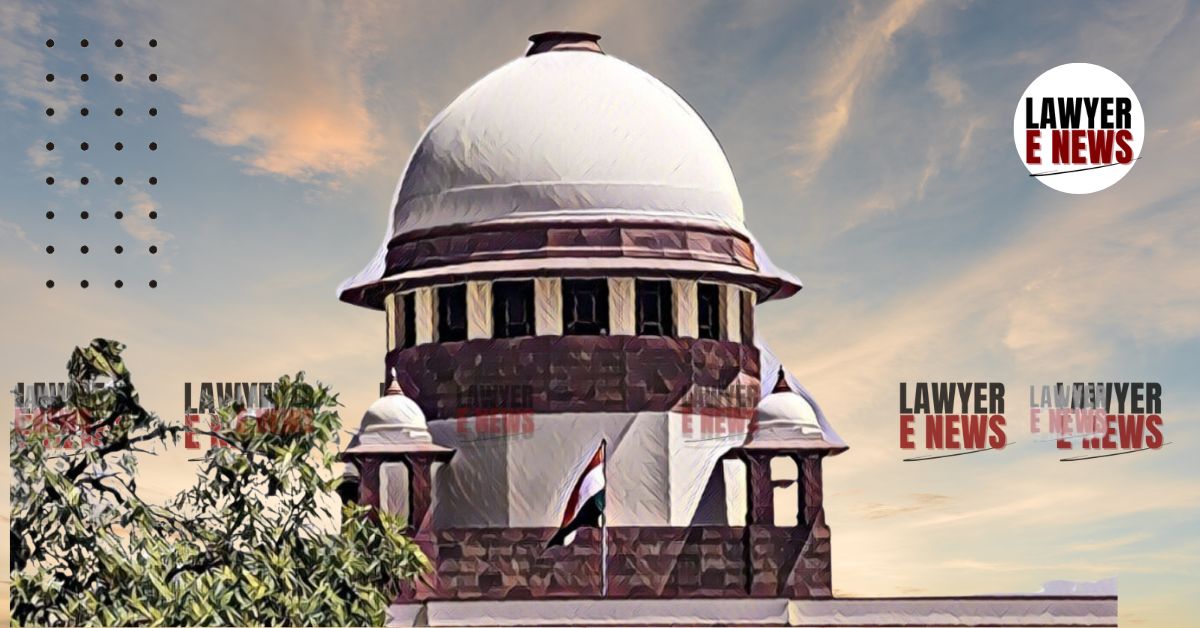-
by sayum
17 February 2026 5:33 AM



"To Ask the Appellants to File a Suit for Possession Would Be Like Adding Insult to Injury" - Supreme Court delivered a landmark verdict ending an 84-year-long unlawful possession of private property by the Maharashtra Police Department. Setting aside a Bombay High Court judgment that dismissed the owners’ writ petition, the Supreme Court exercised its writ jurisdiction under Article 226 to order the State to vacate two flats in Mumbai. The flats had been forcibly retained by the Police Department since 1940 without any lawful requisition, lease, or written authority. “The State cannot retain the property for all times to come,” declared the Court, reinforcing the sanctity of private property against prolonged State encroachment.
The dispute centered around Flat Nos. 11 and 12 in 'Amar Bhavan', Mumbai, owned by the petitioners' predecessors. These flats were occupied by families of police personnel since the year 1940. Notably, there was no lease agreement, no requisition order, and no documentation authorizing such occupation. The police department initially paid a nominal rent of Rs. 611 per month, which was stopped in 2007 without explanation.
As attempts to recover possession failed, the appellants filed a writ petition before the Bombay High Court under Article 226 of the Constitution of India. The High Court dismissed the petition on 30 April 2024, terming the occupation “permissive” and advising the appellants to seek redress through a civil suit under the Maharashtra Rent Control Act, 1999.
The Supreme Court framed the key issue as whether the High Court was justified in refusing relief under writ jurisdiction and directing the appellants to file a civil suit despite the State’s blatant illegality.
The Court held that “the rule of exclusion of writ jurisdiction by availability of an alternative remedy is a rule of discretion and not one of compulsion.” The bench sharply criticized the High Court’s mechanical application of the alternative remedy rule, observing, “To ask the appellants to file a suit and recover the possession would be like adding insult to injury.”
Emphasizing the year of initial possession — 1940 — the Court remarked, “This country was ruled by the Britishers in 1940. The Department perhaps might have persuaded the appellants or their predecessors by giving some kind of assurance... It has now been 84 years that the Police Department has been in occupation.”
The Court further stated: “Past eighteen years even rent has not been paid... Look at the conduct of the Department.”
Denouncing Suppression, Delay, and Disregard for Law
The Court noted that repeated opportunities were given to the State to respond constructively. Despite the Court proposing three reasonable alternatives — paying market rent, purchasing the flats outright, or vacating them — the State remained evasive. The Court expressed clear displeasure, stating: “There is no response worth the name at the end of the respondents to the three proposals referred to by us in our order dated 03.03.2025.”
The judgment emphasized that courts exist not just to do justice between parties but also to ensure justice is done to the institution of the judiciary: “This Court is not a laboratory where parties come to experiment… justice is being done to this Court by those present before us.”
Invalid Possession and Enforcement of Fundamental Rights
Referring to the nature of the State’s occupation, the Court was categorical in holding that the possession had no legal basis: “The police occupied the two flats without any written order requisitioning them.”
Rejecting the notion that insufficient stamping or the absence of lease formalities could protect the State’s illegal possession, the Court applied the settled position from the seven-judge bench decision in In Re: Interplay Between Arbitration Agreements and Stamp Act to note that defects in stamping are curable and cannot negate justice.
Moreover, the Supreme Court reiterated the constitutional position that where fundamental rights and gross injustice are involved, writ jurisdiction must prevail: “It is settled law that when a statutory forum is created for redressal of grievances, a writ petition would not ‘ordinarily’ be entertained… This power needs to be exercised in exceptional rarity.”
Convinced that this was one such exceptional case, the Court declared: “We are happy that we have been able to do justice with the appellants who have been frantically trying to get back their property from the State which the State occupied way back in 1940 without any written order requisitioning the two flats.”
The Supreme Court:
Set aside the Bombay High Court’s judgment dated 30 April 2024;
Allowed the original writ petition filed under Article 226;
Directed the Maharashtra Police to vacate the flats within four months;
Ordered the State to pay arrears of rent from 2008 until the flats are vacated;
Directed Deputy Commissioner of Police, Mr. Nitin Pawar, to file an undertaking confirming compliance within one week.
In delivering this ruling, the Supreme Court sent a resounding message: prolonged, illegal occupation by the State, no matter how historic or normalized, will not be protected under law. The rule of law and property rights stand paramount.
Date of Decision: 08 April 2025
